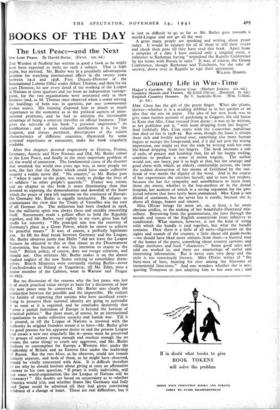BOOKS OF THE DAY
The Last Peace—and the Next
The Lost Peace. By Harold Butler. (Faber. los. 6d.)
THE Warden of Nuffield has written as good a book as he might have been expected to write on such a subject. That is high praise, but merited. Mr. Butler was in a peculiarly advantageous position for watching international affairs in the twenty years between 19i8 and 1938. First Deputy-Director of the International Labour Office under Albert Thomas, and then for six years Director, he saw every detail of the working of the League of Nations at close quarters and yet from an independent vantage- point, for the two organisations were associated only in their finances (and, as M. Thomas once observed when a sewer serving the buildings of both was in question, par une communaute d'eaux usees). His training disposed him to attach as much importance to the economic as to the political aspects of inter- national problems, and he had in addition the inestimable advantage of being a constant traveller on official business. That gives the sub-title of his book " a personal impression " its justification ; and a most valuable justification it is, for the frequent, and always pertinent, descriptions of the salient characteristics of different countries, illustrated by some personal experience or encounter, make the book singularly readable.
After five chapters devoted respectively to Geneva, France, Germany, Austria and New Nations and Old, Mr. Butler comes to the Lost Peace, and finally to the most important problem of all, the world of tomorrow. The fundamental cause of tie disaster that overtook the world two years ago was, as most people see now, the fact that the States which could have made collective security a reality never did. " No country," as Mr. Butler puts it, " when it came to the point, was ready to pledge the lives of its soldiers ' in other people's quarrels,' ' France was rotten, and no chapter in this book is more illuminating than that devoted to exposing the demoralisation and downfall of the State which the peace of 1919 left supreme on the continent of Europe. On Germany Mr. Butler is equally instructive. He refuses to countenance the view that the Treaty of Versailles was the root of all German ills. The militarists had been checked in 1918, but the militarist spirit was always there and steadily reasserting itself. Stresemann made a gallant effort to hold the Republic together, and Mr. Butler, very rightly in my view, gives him full credit for sincerity. " His principal aim was the recovery of Germany's place as a Great Power, which he strove to achieve by peaceful means." It was, of course, a perfectly legitimate aim. As fcit the final break between Germany and the League, Mr. Butler observes justly that Hitler " did not leave the League because he objected to this or that clause in the Disarmament Convention, but because it was his intention to rearm to the limit." British policy, of course, does not escape criticism, and should not. One stricture Mr. Butler makes is on the almost studied neglect of the new States striving to consolidate them- selves. British Ministers were constantly visiting Berlin—never Czechoslovakia or Poland or Yugoslavia, till Mr. Eden, then a junior member of the Cabinet, went to Warsaw and Prague in 1935.
But no discussion of the reasons why the last peace was lost is of much practical-value except as basis for a discussion of how the next peace may be conserved. Mr. Butler sees clearly the distinction between the possible and the impossible. He realises the futility of expecting that nations who have sacrificed every- thing to preserve their national identity are going to surrender it as soon as it is regained, and he concludes decisively that " even a partial federation of Europe is beyond the horizon of practical politics." But there must, of course, be an international crganisation to make collective security and banish war. Till it is created, or till the League of Nations is invested with the authority its original founders meant it to have—Mr. Butler gives no good reasons for his apparent desire to•end the present League and create a new one singularly like it—peace must be preserved by groups of nations strong enough and resolute enough (by no means. the same thing) to crush any aggressor, and Mr. Butler inclines' to contemplate for Europe a Western bloc under the leadership of Britain and an Eastern bloc under the leadership of Russia. But the two blocs, as he observes, could not remain entirely separate, and both of them, as he might have observed, would be vitally concerned with Asia. It is difficult therefore to see why he should hesitate about giving at once an affirmative answer to his own question, " If peace is really indivisible, will not some world-organisation like the League of Nations still be necessary? " His doubts are based on uncertainty as to whether America would join, and whether States like Germany and Italy and Japan could be admitted till they had given convincing evidence of a change of heart. These are real difficulties, but it is just as difficult to go as far as Mr. Butler goes towards a world-League and not go all the way.
A great many people are speaking and writing about peace today. It would be salutary for all of them to still their voices and check their pens till they have read this book. Apart from a misprint of a date I have noticed only a singular error, a reference to Rathenau having " torpedoed the Rapallo Conference by his treaty with Russia in 1922." It was, of course, the Genoa Conference, though Rathenau and Tcitcherin, for the sake of secrecy, drove over to Rapallo to sign their agreement.
WILSON HARRIS.






















 Previous page
Previous page